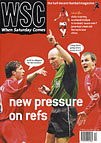 The "referee crisis" fuelled by television exposure that should just be ignored
The "referee crisis" fuelled by television exposure that should just be ignored
As in so many other respects, people often look back on the 1970 World Cup as a golden age of refereeing. Do you know, not a single player was sent off, they will tell you. Not like now, when games are persistently ruined by referees desperate to get into the limelight, imposing absurdly over-fussy regulations.
They should watch the official film of the tournament. El Salvador players are so incensed by a goal given against them in their game against Mexico they simply refuse to kick off again and boot the ball into the crowd. Belgian players virtually throw an Argentinian ref into the net for giving a penalty against them, also against Mexico. Israel and Sweden kick each other to a standstill in a vicious encounter in Toluca. Romania’s Mihai Mocanu almost takes Frannie Lee’s leg off at the knee. But unbelievably, it’s true – no one was sent off.
The death of Ken Aston this month also threw the current refereeing controversies into some perspective. He took charge of one of the most notorious matches in World Cup history, the 1962 blood- bath between Chile and Italy, which, he said, was like being “an umpire in military manoeuvres”.
Amid all the fuss about Dermot Gallagher’s failure to send off Robbie Keane for pushing David Beckham, and Paul Durkin’s response to Graeme Le Saux’s assault on Danny Mills, it’s easy to forget how successfully the game has been purged of some of its old vices. Outright thuggery is far less common than it was, and far more likely to be punished – if not on the spot, then by TV exposure.
Dissent and time-wasting, too, have been fairly effectively curbed, though of course there are always new ways to try it on. Everyone gets annoyed by cheap yellow cards given for things like kicking the ball away and refusing to retreat ten yards, but for every one of those there are 100 cases where players no longer seek to gain a petty advantage because they know they will be cautioned.
The refereeing “crisis”, as with so many other overheated Premiership debates, is one that is largely created by television and fuelled by the need to fill the ever-expanding sports sections with new controversies. On the whole, referees are much fitter than they used to be (the most practical means of ensuring they are closer to the action) and the rules are there to help them keep the game flowing. No one could seriously suggest the state of top-class refereeing is in more of a crisis than it was, say, in the Seventies.
What problems there are have been magnified to the point of absurdity by the ever more intense scrutiny of Premiership and even First Division football – though of course that scrutiny has also brought the worst elements of the players’ and managers’ behaviour into sharper focus.
As others have pointed out, the call for referees simultaneously to be more consistent and to use more “commonsense” is contradictory. Either they interpret the rules rigidly, or they don’t. The best way to promote a healthier relationship between officials and the rest of football would be for managers to keep their often inane comments for the privacy of their report, rather than airing them immediately after the game.
Referees have not always helped them-selves but more often they have been put in impossible positions by their own regulatory bodies. Turning referees into professionals was a good idea, on balance, though it leaves them open to a new line of attack when they make mistakes – as they inevitably will continue to do.
On the other hand, enforcing temporary relegations from the Premiership list (or what is now pompously called the “Select Group”) is absurd. It serves only to encourage players and clubs to put more pressure on referees. “I will not defend the indefensible and I’ve told the referees that on numerous occasions,” said Philip Don, the manager of the Professional Game Match Officials Board, who demoted Gallagher and Durkin for their errors. “They’ve got to improve and to minimise mistakes.” No one could be against that, but singling out individuals for criticism after their decisions have been highlighted on TV hardly seems the best way to go about it.
Can we make referees better? Yes, by giving them more training, more support and more sensible rules to work with. Can we make them perfect? Obviously not. In which case, the best way to “solve” the refereeing “crisis” is for everyone to shut up about it.
From WSC 178 December 2001. What was happening this month